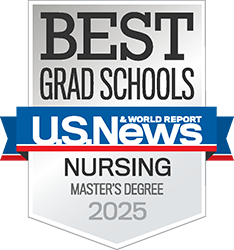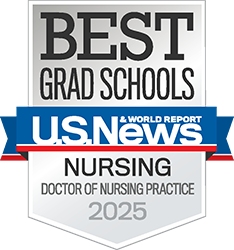Honors Research Program adds up Giving BSN and MSN students a taste for research

Molly Byrne taught math for 10 years before enrolling in Cizik School of Nursing at UTHealth Houston, so quantitative analysis made perfect sense to her. Through the school’s Honors Research Program, the Pacesetter Bachelor of Science in Nursing (BSN) student is now enjoying the challenge of learning qualitative research methods as well.
The Honors Research Program offers talented, motivated students opportunities for enhanced scholarly achievement. Participants learn new skills by working side-by-side with a faculty mentor on research projects.
In addition to BSN students, those pursuing Master of Science of Nursing (MSN) degrees may apply for the Fall 2022 semester. Students may participate in the program after successfully completing one semester at Cizik School of Nursing.
Having an opportunity to work closely with a faculty member is the most appealing part of the Honors Research Program, according to Byrne, who works with Assistant Professor Allison P. Edwards, DrPH, MS, RN, CNE.
“I am getting a one-on-one view of what it looks like to do further research in nursing. I’m getting a bird’s eye view of what it looks like to become a faculty member but also a researcher,” she said. “I think that’s really invaluable.”
Faculty benefit as well, Edwards said. “For students, it is certainly not just a résumé builder, it gives them exposure to research that they wouldn’t traditionally get in an undergraduate program. For faculty, our workload is heavy and the time for research is very limited. Even though they are learning as a student, it is great to have that extra partnership to assist in research project. So, it’s a win-win situation for both students and faculty.”
Byrne has been working on Edward’s qualitative research study that investigates attitudes of nursing students toward patients with disabilities.
“Qualitative research is something that I have never done before. It has been challenging to learn about but also enriching for me,” she said. “I’m learning constantly, and that is a really exciting opportunity for me.”
Throughout the Honors Research Program, Byrne has been learning not only about how to conduct research but also how to boost her critical thinking and leadership skills.
“I have learned from Dr. Edwards that I can make changes if I take the time to investigate and think about how I can make something better,” she said. “She has shown me that if I figure out a way that I think I could help with a problem, then I can figure out a way to solve it.”
Byrne sees commonalities between teaching and nursing, and she is particularly drawn to Edward’s research involving patients with special needs. In addition to the Honors Research Program, Byrne has been participating in the Joan and Stanford Alexander Fellowship in Intellectual and Developmental Disabilities initiated by Edwards, and in clinical rotations throughout the Houston/Galveston area assisting with care for patients living with intellectual and developmental differences. She is also in the Cizik School of Nursing Ambassador Program and tutors undergraduate students.
“I feel like half of nursing is patient education when you are at the bedside or working in clinics. Everything that I learn here makes me more affirmed that this is what I am meant to be doing,” she said. “The caring profession side of nursing is really important to me because that was what I loved about teaching. Working with people is something that I know that I need in my career.”
Main difference between the BSN and MSN Honors Research Program is that BSN students are required to complete 45 contact hours while MSN students complete 60 contact hours each semester, said Associate Professor Sandra M. Branson, PhD, MSN, RN, CNE.
Learn more about the eligibility requirements to apply, and contact Branson with any questions.
(Banner image: Dr. Allison Edwards and Pacesetter BSN student Molly Byrne.)
Merve Erten



